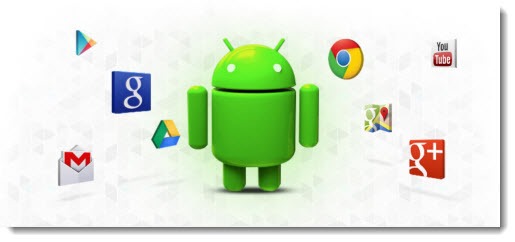
Let’s peer over the wall into the Google garden.
The changes in one ecosystem are more or less irrelevant if you’re committed to one of the others. Pieces of the Google, Apple, and Microsoft ecosystems can be used across platforms, but you’ll get the biggest rewards if you declare your allegiance to one of them and ignore the others.
So if you’re an Apple person, or a Microsoft person (like me), then consider this a quick guide to some of the new tourist attractions in the Android world.
ANDROID PHONES
The stream of Android phones coming onto the market has turned into a flood. When Samsung was designing its latest entry, the Galaxy S4, it decided to include as many gizmos as possible, regardless of whether they make any sense, so the Galaxy S4 has a barometer, of all things, in addition to a magnetometer, proximity sensor, gyroscope, accelerometer, thermostat, and humidistat. Honest. Samsung has sold more than twenty million of them since the launch in March.
Beleaguered HTC did not get much of a response to its beautiful Windows 8 Phone, the HTC 8X, but it’s going to give it another try with the HTC One, perhaps the best-engineered Android phone to date. The HTC One is available now from AT&T and Sprint, with Verizon promising its own version later this summer.
To be honest, it’s been a while since there has been any interesting difference between the Android phones. A little faster, a little slimmer, a slightly newer version of Android – it’s been a while since there’s been much excitement in the world of Android phones. Not very many Android phone users are breaking out in a sweat while they wait for their contracts to end.
CHROMEBOOKS
Chromebooks – lightweight, dirt cheap small laptops running Google’s Chrome OS – are flying off the shelves, the fastest growing segment of the computer market. Check that: the only growing segment of the computer market. Traditional PC sales are falling as consumers and businesses stock up on tablets and smartphones, but Chromebooks are so cheap – $200-$300 – that people are buying them even though they’re fairly useless.
If you’re invested in the Google ecosystem, then your new Chromebook will immediately feel like home, connected to your email, calendars, contacts, bookmarks, and all the other Google services tied to your account. If, however, you buy a Chromebook and you’re not a Google person, then the Chromebook will let you: view websites. That’s about it. Chromebooks don’t run Android and don’t have access to all the Android apps in Google Play, the app store. An Android tablet is frankly a lot more capable device than a Chromebook.
But they’re cheap! And perhaps these days that’s enough.
Incidentally, I was in Best Buy recently and was appalled at the tables loaded with $300-$400 Windows laptops. You know they’re horrible, right? They’re made of plastic, they’re underpowered and slow, they’re loaded with adware, and they’ll break in a heartbeat. Sometimes buying something cheap just means you get cheap crap, okay?
PLACING PHONE CALLS FROM HANGOUTS
Last week Google restored the ability to place voice calls from Gmail and Google Hangouts. Calls to the US and Canada are free.
This might be a swell thing for Google citizens.
As an outsider, the first problem is that this requires having a clue how to use Google Hangouts, which appears to have some relationship to Google+. It all baffles me. I’ve spent a surprising amount of time trying to figure out the Google social services and I cannot get past the feeling that I’m missing something. Maybe it starts to make sense if you live there. Google redesigned Google+ recently and it looks very pretty, I guess, but I have no idea what my Google+ page is displaying or how to put it to good use.
If you’re comfortable in Gmail and you dig Hangouts and you have a microphone and headset on your device and you’ve added everyone’s phone number to your Google Contacts and you don’t already have unlimited voice calls from one of your other accounts, then maybe it’s great that you can make voice calls through Hangouts. The rest of us? Not so much.
GOOGLE READER AND OTHER GOOGLE R.I.P.
Google Reader, the service that displayed updated news feeds and blogs from around the web, has been turned off. A few hundred thousand people are very upset about that. I’m annoyed but Feedly makes a fine replacement.
Marco Ament probably comes closest to the explanation of why Google killed Reader, which required little in the way of resources: “Google Reader is just the latest casualty of the war that Facebook started, seemingly accidentally: the battle to own everything. While Google did technically “own” Reader and could make some use of the huge amount of news and attention data flowing through it, it conflicted with their far more important Google+ strategy: they need everyone reading and sharing everything through Google+ so they can compete with Facebook for ad-targeting data, ad dollars, growth, and relevance.”
Google is continuing to shut down other little-known services – this week we’ll lose Google Latitude and Google Alfred, whatever they might have been.
Those are just some of the new attractions in the Google garden. Google and Microsoft and Apple are not slowing down, either. Pick an ecosystem and stick with it! It’s hard enough to keep up with only one of them.

